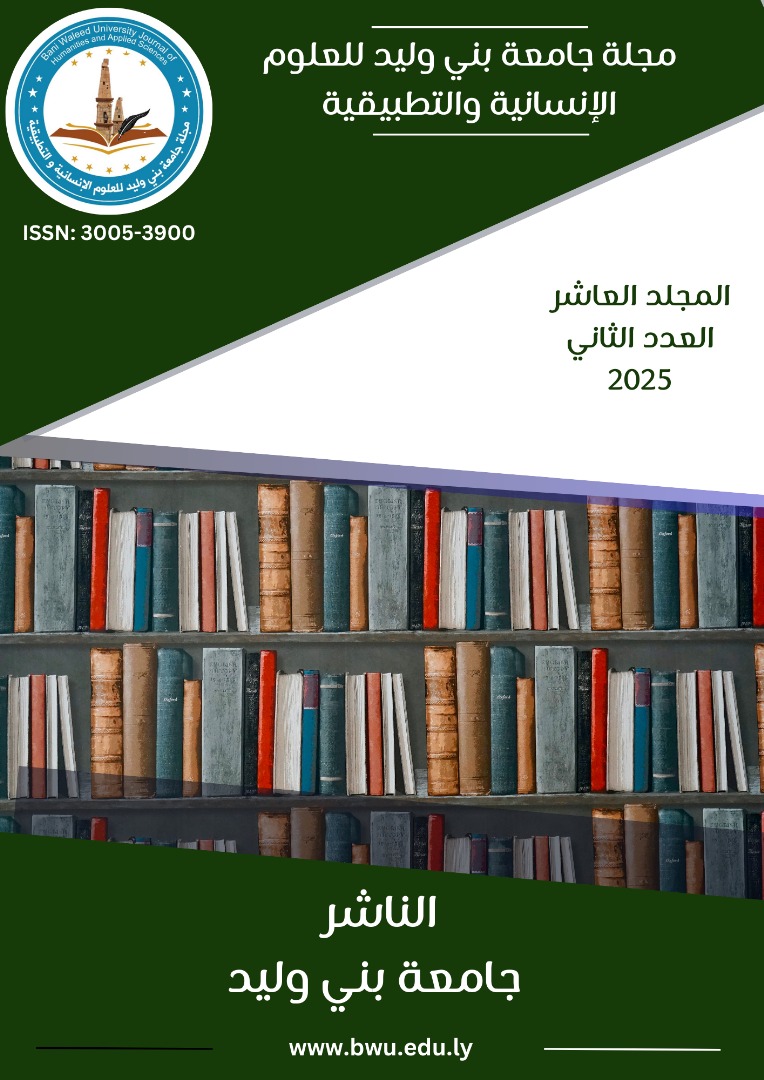The Difficulties Faced by High School Students in Physics
DOI:
https://doi.org/10.58916/jhas.v10i2.746Keywords:
Educational challenges, academic difficulties, high school students, physicsAbstract
This research explores the challenges faced by high school students in physics, analyzing their causes and impact on academic performance. The researcher examined the key obstacles that hinder students’ grasp of physics concepts.
In this context, the research objectives were defined to focus on analyzing these challenges and proposing modern educational strategies to help students overcome them. A representative sample of high school students from Bani Walid was selected to ensure an accurate reflection of the study population.
The study adopted a descriptive-analytical approach, collecting data through a questionnaire that covered key areas such as mathematical difficulties, shortage of equipment, scientific language barriers, and academic support. The data was analyzed using SPSS to assess the extent of these difficulties and explore their interrelations.
The findings indicated that mathematical difficulties were the most significant challenge (70%), followed by scientific language barriers (65%), then shortage of equipment and practical experiments (60%), and finally, limited academic support (55%). Based on these findings, the researcher provided practical recommendations to enhance academic performance, including the integration of technology into education, fostering collaboration between students, teachers, and parents, and ensuring the availability of essential laboratory equipment.
Downloads
References
Foreign references:
Awandia, J. T. (2024). Physics Teaching Methods and Its Impact on Students’ Academic Achievement in Secondary Schools in the Limbe I Municipality. American Journal of Multidisciplinary Research & Development, 6(8), 17–26.
Hansson, T. (2024). How is Physics Hard? Exploring Upper Secondary School Pupils’ Stories About an Ambiguous Subject. Chalmers University of Technology.
Mwima, H., & Ounyesiga, L. (2025). Causes of Poor Performance in Physics at 'O' Level Secondary Schools: A Case Study of Selected Secondary Schools in Kigandalo Subcounty, Mayuge District. Kampala International University.
Ministry of Education Zambia. (2025, February). Physics Teaching Module – Form 1 (Highridge). Ministry of Education Zambia.
Latifah, R. N., Sutopo, & Hidayat, A. (2024). Physics Learning Media with Multirepresentation: A Systematic Literature Review. Jurnal Penelitian & Pengembangan Pendidikan Fisika, 10(2), 353–366.
Al-Kamzari, A., & Alias, N. (2024). Exploring the Readiness of High School Physics Students for Project-Based Hybrid Learning in the Sultanate of Oman. Eurasia Journal of Mathematics, Science and Technology Education, 20(1), 1–15.
Johnson, R. (2016). The role of parental support in enhancing student achievement in scientific subjects. University of Chicago.
Brown, J. (2018). The impact of extracurricular activities on students' understanding of physics. Yale University.
White, B. (2019). The importance of interaction between students and teachers in improving subject comprehension. University of Toronto.
Harrison, D. (2020). The effect of using visual aids in teaching physics. University of Sydney.
Johnson, R., & Smith, T. (2017). The impact of practical experiments on students' understanding of physics concepts. Harvard University.
Brown, S. (2015). The role of academic support in enhancing student performance. University of Oxford.
White, P., & Harrison, J. (2016). The relationship between linguistic understanding and scientific comprehension in physics. University of Cambridge.
Smith, L., & Jones, M. (2018). Enhancing student engagement in physics through modern teaching techniques. Stanford University.
Williams, D., & Lee, S. (2019). The impact of technology on physics education. University of California.
Foreign references translated into Arabic:
Ondia, J. T. (2024). Physics teaching methods and their impact on secondary school students' academic achievement in Limbe I Municipality. American Journal of Interdisciplinary Research and Development, 6(8), 17–26.
Hanson, T. (2024). How difficult is physics? Exploring senior secondary school students' stories about a mysterious subject. Chalmers University of Technology.
Mwema, H., and Onyeasega, L. (2025). Reasons for poor performance in physics at secondary school "O" level: A case study of selected secondary schools in Kigandalo District, Maiuge District. Kampala International University.
Ministry of Education, Zambia. (February 2025). Physics Teaching Unit – Year 1 (Highridge). Ministry of Education, Zambia.
Latifa, R. N., Sutopo, and Wahdiyat, A. (2024). Physics Teaching Aid with Multiple Representations: A Systematic Literature Review. Journal of Research and Development in Physics Education, 10(2), 353–366.
Al-Kamzari, A., and Alyas, N. (2024). Exploring Secondary School Students' Readiness to Study Physics Using Project-Based Hybrid Learning in the Sultanate of Oman. Eurasian Journal of Mathematics, Science, and Technology Education, 20(1), 1–15.
Johnson, R. (2016). The Role of Parental Support in Enhancing Student Achievement in Science Subjects. University of Chicago.
Brown, J. (2018). The Effect of Extracurricular Activities on Students' Understanding of Physics. Yale University.
White, B. (2019). The Importance of Student-Teacher Interaction in Improving Subject Understanding. University of Toronto.
Harrison, D. (2020). The Impact of Using Visual Aids in Physics Teaching. University of Sydney.
Johnson, R., and Smith, T. (2017). The Impact of Practical Experiences on Students' Understanding of Physics Concepts. Harvard University.
Brown, S. (2015). The Role of Academic Support in Enhancing Student Performance. University of Oxford.
White, B., and Harrison, J. (2016). The Relationship between Linguistic and Scientific Comprehension in Physics. University of Cambridge.
Smith, L., and Jones, M. (2018). Enhancing Student Engagement with Physics through Modern Teaching Technologies. Stanford University.
Williams, D., and Lee, S. (2019). The Impact of Technology on Physics Education. University of California.
Arabic References:
Al-Ali, F. (2018). The Impact of Mathematical Complexity on Students' Understanding of Physics. King Saud University.
Al-Zahrani, M. (2020). The Evolution of Educational Curricula, Increasing Requirements, and Their Impact on Student Achievement. Umm Al-Qura University.
Abu Zaid, A. (2019). The Impact of Scientific Language Used in Physics Textbooks on Students' Level of Comprehension. Cairo University.
Karim, H. (2021). Innovative Instructional Strategies to Support Students in Physics. Kuwait University.
Ali, K. (2017). The Role of Practical Experiments in Enhancing Students' Scientific Understanding. United Arab Emirates University.
Ahmed, N. (2020). The Impact of the School Environment on Students' Achievement in Physics. Various Schools in Egypt.













